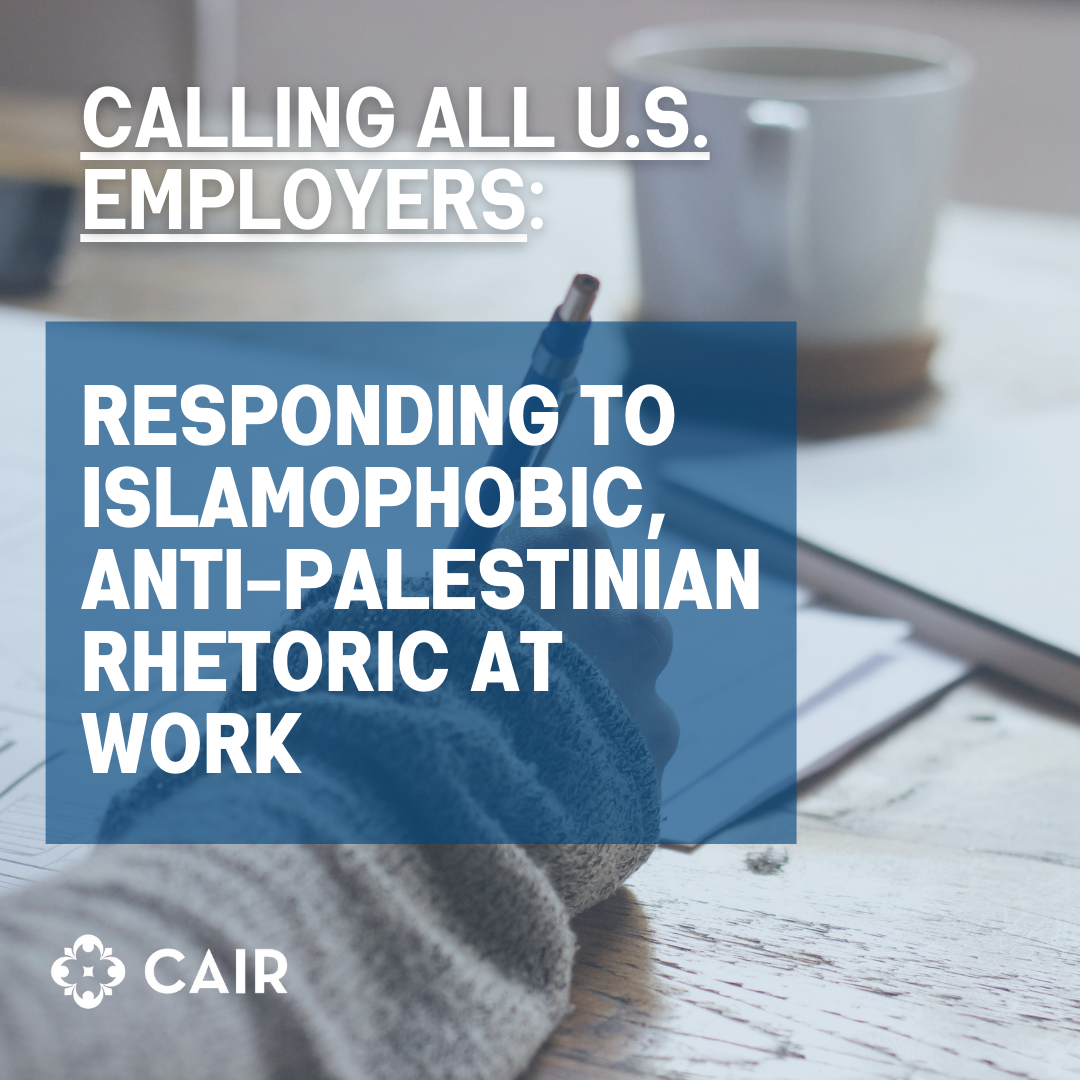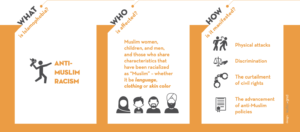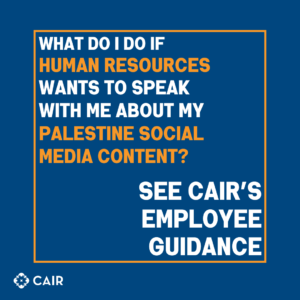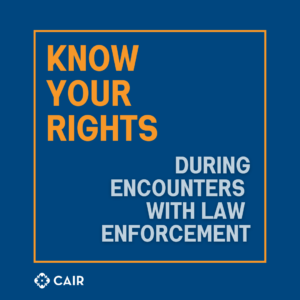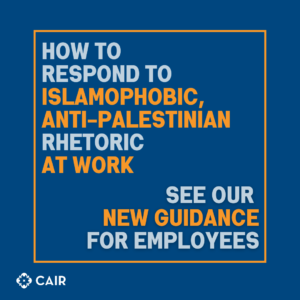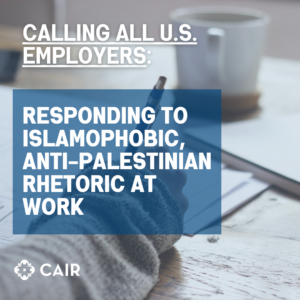We wish to bring to your attention concerning trends reported to us in U.S. workplaces in light of current Israeli bombing of Palestinians in Gaza and killings in the West Bank. CAIR has received complaints from Muslim, Arab-American (including Palestinian), and Pro-Palestinian employees across the country who are afraid for job security and feeling their workplaces have fostered a hostile work environment caused by Islamophobic and anti-Palestinian messaging.
As you know, the ongoing Israel-Gaza conflict has left a profound impact on many individuals, both locally and globally. This conflict has had far-reaching consequences, affecting not only the people directly involved but impacting the entire region and family members abroad. As of October 18, 2023, according to the Wall Street Journal, the Israeli government had killed 1,900 Palestinians and wounded nearly 7,700. More than half of the dead are women and children. Israel reported that Hamas has killed 1,300 Israelis and wounded 3,000 people. Hundreds of thousands of Palestinians have been displaced across Gaza due to Israeli air raids.
Diversity, Equity, and Inclusion departments have sent emails to employees condemning violence occurring in Israel, offering support to their Jewish and Israeli employees, and in some cases, even asking employees to donate to relief organizations for Israelis. Muslim and Arab-American (including Palestinian) employees have generally not been offered the same support and are not acknowledged as victims of this terrible humanitarian crisis. These one-sided statements do not promote diversity, equity, and inclusion and leave employees feeling not only isolated, but in some cases targeted.
We are concerned about the well-being of Muslim and Palestinian employees as well as those who have family or personal ties to the region, and those who advocate for human rights for Palestinians. We are asking that employers exercise their duties and responsibilities to protect their employees from experiencing harassment due to their background and their speech. We also ask that employers ensure that their employees receive the requisite accommodations for any anxiety, depression, or post traumatic disorder they may be experiencing at this time.
CAIR encourages employers to familiarize themselves with the decades-long context surrounding this conflict. See this factsheet on Gaza produced by the United Nations Office for the Coordination of Humanitarian Affairs, and this report on the current state of relations between Israel and Palestine produced by Amnesty International.
Legal Limitations on Employer Actions
Employers must familiarize themselves with legal protections for employees who are a member of a protected class. Employers should take steps to protect all employees from harassment, especially their Arab, Muslim, or Palestinian origin employees who are being targeted because of the anti-Palestine and Islamophobic rhetoric and news media coverage. Failure to prevent harassment may result in a Title VII or other civil rights violation.
Title VII of the Civil Rights Act prohibits employers from discriminating against their employees on the basis of race, color, religion, sex, and national origin. Employers may not refuse to hire or discharge an individual because of a protected class. Employers may not discriminate against their employees with respect to compensation, terms, conditions, or privileges of employment because of a protected class. Title VII also prohibits employers from retaliating against employees who complain about discrimination, communicate with management about discrimination, or refuse to follow orders that would be discriminatory.
Title VII also prohibits employers from causing or refusing to prevent a hostile work environment, an environment in which employees feel uncomfortable, scared, or intimidated due to unwelcome conduct. A hostile work environment can include harassment, discrimination, victimization, or other offensive behaviors. Employers may be liable for harassment by non-supervisory employees or non-employees over whom it has control (like independent contractors or even customers), if it knew or should have known about the harassment and failed to take prompt and appropriate corrective action.
Section 1981 prohibits discrimination on the basis of race, color, and ethnicity when making and enforcing contracts, and grants all individuals within the US jurisdiction the same rights and benefits as “enjoyed by white citizens” regarding contractual relationships. 42 U.S.C. § 1981(a). Employers who retaliate against employees because of their Arab or Palestinian origin by terminating their employment risk a Section 1981 violation.
Under both Title VII and Section 1981, employers should be mindful not to treat their Palestinian or Muslim employees differently than their Israeli or Jewish counterparts. A situation in which we believe an employee may have an actionable claim would be if a Palestinian or Muslim employee was disciplined for posting a Palestinian flag or expressing Pro-Palestinian sentiments at work, but an Israeli or Jewish employee is not disciplined for posting an Israeli flag or expressing Pro-Israeli sentiments at work. An employer would be discriminating against the Palestinian employee on the basis of national origin, or the Muslim employee on the basis of religion.
Moreover, if employers are offering benefits such as paid compassionate leave to their Jewish or Israeli employees, an employer should offer the same benefits to their Palestinian or Muslim counterparts.
The National Labor Relations Act protects the rights of employees covered by the NLRA to act together to address conditions at work, with or without a union. Under Section 8(a)(1) of the Act, an employer may not “interfere with, restrain, or coerce employees” in the exercise of their Section 7 rights.
The protection extends to certain work-related conversations both in-person and conducted on social media. We believe the NLRA protects employees who address one-sided rhetoric in their workplace, or employees who voice their opinion and oppose the creation of a hostile work environment that may be caused by Pro-Israel or Anti-Palestinian messaging.
The First Amendment protects government employees from retaliation for exercising free speech so long as they are speaking as a private citizen about a matter of public concern and the speech does not interfere with their job. Government employers should be mindful of free speech protections. Employees using non-work affiliated social media accounts to protest human rights abuses against Palestinians should not be disciplined.
Best Practices for U.S. Employers
Executives set the tone in the workplace. Employers must be mindful of the tone they’re setting and ensure that all of their employees feel welcome and protected. They should be aware that there are many communities that have been impacted directly and indirectly by the conflict abroad, including Palestinians, Muslims, and Arabs generally.
U.S. employers should take these non-exhaustive measures to demonstrate commitment to supporting the well-being of their employees:
1. **Check-in with employees:** Reach out to your Palestinian employees to inquire about their well-being and express empathy for their concerns. Create a safe and open space for them to discuss their experiences and emotions if they wish.
2. **Provide mental health resources:** Offer mental health support resources, such as counseling services or Employee Assistance Programs, to all affected employees. Recognize that the emotional toll of the conflict can be overwhelming, and access to professional help is essential.
3. **Offer flexibility:** Be flexible with your Palestinian employees’ needs, such as allowing for additional time off or adjustments to their workload to accommodate their personal circumstances.
4. **Schedule diversity and inclusion training:** Consider providing diversity and inclusion training for all employees to enhance understanding and empathy regarding the impact of international conflicts on individual lives. Diversity and inclusion initiatives are made in bad faith if they fail to take into consideration that impacts of the conflict on Palestinians and Palestinian employees.
5. **Learn about the conflict:** U.S. based media outlets have failed to recognize the impact that the Israeli government’s discriminatory laws and policies have had on Palestinians. We urge employers to learn more about the humanitarian crisis in Gaza through credible human rights organizations, as well the United Nations.
6. **Refrain from releasing polarizing statements:** If employers wish to address the conflict, they should stay neutral or refrain from releasing polarizing statements. Employers should also refrain from any Islamophobic or anti-Palestinian terms. Statements should recognize that the loss of human life in any case is a tragedy.
By taking these steps, we believe that companies can help create a supportive and compassionate environment that values the well-being of all employees, regardless of their background or personal experiences.
We welcome the opportunity to collaborate and assist in implementing these measures. Together, we can work toward a more just and compassionate society.
Sincerely,
Council on American Islamic Relations
